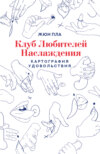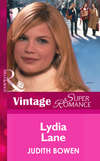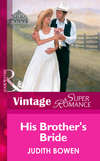Читать книгу: «A Home Of His Own»
“I want to get married, Lewis.”
“Are you sure about this, Phoebe?” he asked.
“Absolutely,” she answered. She looked at him. “Are you?”
He nodded. “Yes. I love you. I’d do anything for you. Anything.”
She’d lost him for years and now she’d found him again. She wasn’t letting him go back to Edmonton and maybe find some other woman. Besides, she was tired of always being the good girl in her family, tired of always having to be sensible.
But how to explain this sudden urgency? The sudden overwhelming desire she’d felt this morning, watching him sleep, to be his, really his. In the most sacred, profound way. Marriage. “I know it seems kind of crazy, but doing it like this cuts out a lot of trouble. You know what I mean?”
“Uh-huh. Your folks.” His dark eyes were steady on hers.
Phoebe glanced away. “Them. And everyone else. They don’t know you the way I do. They’d bring up all kinds of complications. They’d think we should get married in a church. All that fuss. Weddings are stupid, anyway! Being married is what counts.”
“Is it?” He turned to study her. “You know I’ll do anything you want, Phoebe, even sneak off like this and marry you. But we can’t hide forever.”
“It’ll just be a secret for a while,” she told him. “Ours!”
Dear Reader,
Writing a collection of books set in and around the small town of Glory, Alberta, has been a challenge and a source of joy for me. I have lived in so many small towns myself that Glory has come to reflect everything I like and dislike about small-town living. No one can say there aren’t disadvantages—lack of privacy, interfering neighbors, limited shopping. But there are great advantages, too—a sense of community, parents looking out for their neighbors’ children, knowing that you’ll always find help if you ask for it.
Lewis Hardin, a young man in trouble in my first MEN OF GLORY book, The Rancher’s Runaway Bride, has always longed for something we all cherish: a home of our own. In this story, with childhood sweetheart Phoebe Longquist’s help, Lewis discovers his special place in more ways than one.
I hope you’ll enjoy the love story between Lewis and Phoebe. It was a wonderful book to write, and brings the folks of Glory full circle, back to the beginning. The place we call home.
Judith Bowen
P.S. Let me know how you’ve enjoyed the MEN OF GLORY books and thank you for your many, many letters over the years. You can reach me at P.O. Box 2333, Point Roberts, WA 98281-2333. Or check out my MEN OF GLORY web page at www.judithbowen.com.
MEN OF GLORY titles in Superromance:
739—THE RANCHER’S RUNAWAY BRIDE
791—LIKE FATHER, LIKE DAUGHTER
814—O LITTLE TOWN OF GLORY
835—THE DOCTOR’S DAUGHTER
872—HIS BROTHER’S BRIDE
900—THE RANCHER TAKES A WIFE
A Home of His Own
Judith Bowen
CONTENTS
CHAPTER ONE
CHAPTER TWO
CHAPTER THREE
CHAPTER FOUR
CHAPTER FIVE
CHAPTER SIX
CHAPTER SEVEN
CHAPTER EIGHT
CHAPTER NINE
CHAPTER TEN
CHAPTER ELEVEN
CHAPTER TWELVE
CHAPTER THIRTEEN
CHAPTER FOURTEEN
CHAPTER FIFTEEN
CHAPTER SIXTEEN
CHAPTER SEVENTEEN
CHAPTER EIGHTEEN
CHAPTER NINETEEN
CHAPTER ONE
THE FIRST TIME Phoebe saw Lewis Hardin she was maybe ten. She’d gone out to the Hardin place, at the top of Bearberry Hill, with her mother to deliver some parceled-up goods from the parish. The Hardins weren’t Catholic, as far as Phoebe was aware, but that didn’t matter: they were poor.
That afternoon, bored with the adults’ visiting, Phoebe had climbed a massive poplar in a copse near the Hardins’ old post-and-beam barn, then had daringly crawled onto a ledge that led to the loft. The loft contained very little hay. The roof, under the rafters, was thick with the nests of barn swallows; it echoed with the squeaky shrills of the parents swooping in to stuff their offspring’s bellies with mosquitoes, then out again. There were no animals in the barn, only a few badly rusted farm implements. She’d heard a rhythmic rap-rap sound below somewhere and had crept from one side of the loft to the other, peering through the square holes in the floor cut out for hay and straw to be thrown down to horses or cows.
She was afraid, but she was thrilled, too. This was an adventure. Even dangerous, up here with the stinky hay and the uncertain footing. By herself, too—no Jilly tagging along. The fun of having a new little sister had worn off long ago.
Finally, almost on top of the rap-rap sound, Phoebe cleared the hay cautiously from the place where the wall of the barn met the floor of the loft and peered down. She spotted a boy, about fourteen or fifteen, hammering on a homemade punching bag made from an old feed sack, it looked like, filled with straw. He jabbed at the bag, grunting at the effort, his skinny body gleaming with sweat in the shafts of afternoon sunlight that lazily probed the deep gloom of the barn’s interior. The punching bag hung in one corner of a box stall that had been fixed up with a bed and pallet and a rickety-looking table and bench. There were candles set into pop bottles, on the table, a knife, chunks of wood and several plastic bread bags. Was there food in them? It seemed that the boy lived in the stall, or at least slept there part of the time. A few boards pried out of the barn siding provided an exit.
Phoebe held her breath, rapt. Finally, with a last vicious series of jabs and a shout that thrilled her blood, he swung away from the bag and sank heavily onto the wooden chair. After a few moments of hard breathing, he retrieved his T-shirt from the adjoining pallet and put it on, then picked up the knife and a piece of wood from the table and began whittling.
She was certain he hadn’t seen her, not with the racket from the birds above. She was just thinking of how she could inch her way back, desperately afraid she’d sneeze or something, when he looked up and grinned. “Here you go, you little peeper!” He tossed something at her and she ducked. When she raised her head again, he was gone. She felt around in the hay until she found what he’d thrown. It was a small wooden frog, crudely carved.
Five years later…
SHE’D THOUGHT it was beautiful and had kept it on her windowsill ever since. She’d gone back up to the house to join her mother and the Hardin women that day, but the boy had not appeared.
Now, at nearly fifteen herself, on another such mission of charity, with her mother and her aunt Catherine this time, Phoebe thought about that silly wooden frog. It was grubby from handling, and once she’d actually thrown it away; the next day, she’d dug through her bedroom trash basket and retrieved it. It brought her luck. Or happiness. Something that didn’t bear thinking about.
Saint Augustine’s kept a list of the families they helped in the area, and Bearberry Hill was within the parish. Nothing remained there but a white-painted clapboard church with a windblown cemetery at the brow of the hill and the ramshackle settlement that marked the Hardin place. If there’d been a husband for the older woman, Mercedes Hardin, he was long gone and forgotten by the community. Her daughter, Billy, lived with her, a young-old woman of perhaps forty. She was not right in the head, some said, and others said she was peculiar by choice. Mercedes looked older than her sixty-some years, with flyaway white hair and watery blue eyes. Because of a hip broken years earlier, she favored one leg and walked with a cane, which had always made her seem older. There was another member of the family, Phoebe knew—the son, Lewis. He was in jail.
Ever since Lewis Hardin had gone to jail for rustling cattle the year before, Cal Blake, the rancher who lived up the road a few miles, had kept the Hardins supplied with beef and firewood. He’d promised Lewis they’d be taken care of, according to a neighbor, which was strange, considering it was Cal’s beef that Lewis and a gang of n’er-do-well cowboys had stolen.
“I hear Mercy still keeps a fine garden,” her mother said, from the driver’s seat. “And no one can say they’re afraid of work, the two of them, living like they do.”
“Nan,” her aunt sniffed. “Be sensible. It’s no way to live, two women out here alone. They ought to move to town.”
“Mercy was born on the place and she’d told me once the only way she’ll be leaving is feet first,” replied Phoebe’s mother.
Feet first, Phoebe knew very well, meant dead. Phoebe sat in the back, between two large sacks of used clothing from the parish thrift store, which had been chosen with the Hardin women in mind, and a box of groceries on the floor of the station wagon, which had come from the Glory food bank. Canned goods, mostly—ham and soup and condensed milk—although Phoebe could see several boxes of pasta and, oddly, a flat, paper-wrapped tin of anchovies. Anchovies!
A view of the azure blue Pacific off Peru, silvery with the tiny fish, flashed through Phoebe’s mind…
“And that boy of hers—ooh!” Her aunt shuddered and made a face Phoebe could see in the rearview mirror. “Thank goodness he’s where he belongs—in jail! He’s been nothing but trouble since he was born. Imagine another one coming so long after Billy? It makes a body wonder who the father was…”
“Oh, Catherine,” her mother murmured, driving slowly and carefully. “I don’t suppose anyone cares about all that. Not now. Not after so many years.”
How many years? About nineteen or twenty, Phoebe guessed later when she came across him at the bottom of the orchard—mainly twisted crab apple trees and blighted russet pears. He frightened her, sitting there on a long-downed tree trunk, so still and so alert at the same time. He blended into the dry grass. If she hadn’t smelled the cigarette smoke, she might not have seen him at all. And that thought scared her more.
She’d asked Mercy Hardin if she could go and see the sheep that she’d noticed from the road when they turned into the lane. Since that first long-ago visit, the Hardin women had acquired a scruffy clutch of sheep, black and brown and white, that they kept for who knew what reason. Meat, perhaps. Or wool.
Two of the Hardin dogs, who’d barked madly at the car as they drove up to the house, lay at the man’s feet.
“Come here,” he said quietly. At first she didn’t realize it was Lewis. He was supposed to be in jail. “Are you afraid of me?” His eyes narrowed through the cigarette smoke. He wore an old shirt and jeans, no jacket, even though it was cold enough that Phoebe had worn the new wool coat her mother had bought her for school in September. His boots were black, sturdy and plain. Government issue.
“I’m not afraid,” she said, picking her way toward him through the fallen branches and frozen windfall fruit. It was true; she wasn’t. She stood in front of him. “You shouldn’t smoke. It’s a filthy habit.”
He laughed and threw the stub of a cigarette away. It smoldered in the frosty grass. “Who’s up there?” He frowned and hunched one shoulder toward the house.
“And you shouldn’t throw away lighted butts like that. You could start a forest fire.”
“Aw, can it, kid. Who’s up there?” he repeated.
She frowned. “At the house, you mean?”
He nodded impatiently.
“Just my mother. And my aunt Catherine.”
“That’s all?”
She nodded and he patted the log he was sitting on. “Have a seat. I’m not gonna bite you.”
She sat beside him. He edged closer to her, against her, and she realized he was shivering. “How’re Ma and Billy?”
“Why? Haven’t you seen them?” She was thoroughly confused. What was he doing here in the orchard, anyway?
He glanced over his shoulder in the direction of the house. “Naw. Not yet. I’m supposed to be in jail, didn’t you know?” He smiled briefly. His features were harsh and pinched. All these years she’d remembered a dark intensity, a passion, to his thin face; what she now saw was hunger and a certain grim determination.
“Well, why aren’t you?” Later, when she thought about it, she wondered at her nerve.
“I left. Got tired of the food they shove at you in there.” He winked and put his arm around her shoulders in a sudden, impulsive gesture, and held her close against him. “Man, it’s cold! I could use a cup of coffee and a bellyful of beef stew. Some nice warm Parker house rolls. Ma done her baking today?” He had a wistful look in his eyes, then came the knowing, self-deprecating laugh again.
Phoebe stared at him. She shook her head. “I don’t know.” She unwrapped the scarf from around her neck, the one her grandmother had knitted, and gave it to him. “Here, this will make you a little warmer.”
He buried his hands in the scarf. “You’re a good kid, you know that?”
Phoebe shrugged. “Well, I guess I’d better go back to the house.” She made a move, as though to get up, but he bumped her with his shoulder, on purpose. She could feel her thigh warm against his. Her thigh and her arm and her shoulder.
“You won’t say nothing?” He shot her a penetrating look. “About me down here?”
She hesitated. “They’ll get you, you know. Eventually, you’re going back to jail. For even longer.”
He laughed again. “Yeah, yeah, I know that. I just needed a break, y’know? Little holiday. I wanted to see how Ma and Billy were getting on. When your ma leaves, I’ll go up to the house, say hello.” His face was so close to hers. He hadn’t shaved in a while. She couldn’t think of any of her friends who wouldn’t have been scared to death in her situation. Natasha Jarvis, her best friend, would have died. Imagine—she was talking to an escaped convict!
“I— I hate it there,” he burst out. “You can’t understand, a kid like you, what it’s like to be trapped, spied on—” He clamped his jaws closed, as though he’d stopped himself from admitting something. That he missed home. That he longed to be free. Then he shocked her. “Listen, you ever kiss a man?”
“N-no,” she said slowly, shaking her head. She began to get up. He grabbed her arm and she shook him off.
“Boys? You ever kiss boys?”
Phoebe decided to lie. “A few,” she said airily.
He stood up suddenly and put his arms around her. “Kiss me.”
Then his face was right up against hers, and he nuzzled her nose and forehead, as though she were a kitten. He kissed her, softly at first, and then more and more intensely, and she felt rivulets of something weird shoot through her body, through her legs and arms, through her stomach. His mouth was wet and soft and faintly, disgustingly, smoky from his cigarette. But oh, so warm and exciting! Phoebe kissed him back, as well as she knew how, which wasn’t very well at all.
His arms were tight around her, iron bands. Then she felt his hands, cold and hard, under her coat and slipping up under her sweater against her hot skin. She moaned and shivered and pressed herself against him. Suddenly he released her and she nearly fell backward. His eyes were dark and flat. He pulled her sweater down and fastened her coat. “You’d better go, kid. Before we’re both in trouble.”
She began to make her way, stumbling, across the orchard. He called after her, “Hey, kid!”
She stopped. She needed to, anyway, her heart was pumping so hard.
“What’s your name?”
She hated her name. It was a stupid, old-fashioned, ridiculous name. “Phoe—” She couldn’t get the whole word out of her throat, couldn’t shout it back to him.
She turned and ran toward the house.
Later her mother had asked what happened to the scarf Granny Longquist had knitted, the one that matched her new mittens. Phoebe said she didn’t know. That she must have lost it somewhere. But she fell asleep dreaming that her scarf was wound around his neck or warming his hands—as she’d seen him do—and that he’d really meant it when he said she was a good kid.
Of course, it was a sin to lie. Especially to your own mother. But somehow this was different. Somehow this mattered less—and, at the same time, more.
When Phoebe was nearly seventeen…
THE NEXT TIME Lewis Hardin went AWOL, he came to Swallowbank Farm.
She and her sister Jill were picking raspberries at the back of the garden behind the house. Her mother wanted to make a shortcake. Normally Phoebe would have resented having to help with the garden, but today she was glad to be outside. It was a glorious late-June day and she’d been studying hard for her final exams. One more year of high school, grade twelve, and if her marks were good, she’d be in line for a decent scholarship. If that didn’t happen, she wouldn’t be going into the science program she wanted. She’d be taking a hairdressing course. With four brothers and sisters and a father confined to a wheelchair, there was no extra money for things like a college education, even with student loans. Not unless the Longquists won a lottery. And her mother, of course, didn’t buy lottery tickets—they were the devil’s work, she said.
So that was that. It was “be a good girl, get good marks and everything will work out.” She knew if she worked hard and did her part, her parents would support her any way they could.
They were good parents. She loved them both dearly. Her father had been injured in a farm accident working for her uncle Joe, her mother’s brother, who owned the place where they lived, Swallowbank Farm. Uncle Joe had kept her father on, doing the books and helping out with other farm chores that he could handle, but it was tough supporting two families on one hay-and-grain farm. Now that Uncle Joe was married, and his wife, her aunt Honor, worked two days a week at the law firm in town, things were a little easier. But not easy enough that anyone—the Gallants or the Longquists—threw money around.
In fact, her mother had told her this morning that she and Jilly could pick extra raspberries, if the crop was heavy, to sell to summer tourists at the neighboring farm’s roadside stand. But Phoebe was past that. She’d earned money doing that as a kid, but no way was she standing at the side of the road selling berries at nearly seventeen. She had a job lined up at the town library for the summer, although that didn’t pay much, either. It was depressing.
She thought of the little frog she’d had for so long. “Bring me some luck,” she muttered to herself, hunched over in the hot sun trying to fill her dishpan, which seemed to have a hole in the bottom of it. “I sure could use some.”
Phoebe had made several passes back and forth along the rows, looking for ripe berries, before she realized she was hearing something peculiar. It wasn’t the magpies chattering on the fence posts, although they did seem unusually agitated. It wasn’t the distant sound of Uncle Joe working in the fields on his new John Deere tractor. It was something else. Phoebe stopped, straightened and adjusted her hat, resting her dishpan half-full of berries on one hip.
“Pssst!”
She frowned. She could see nothing at all. Only the raspberry canes, stretching up six feet or more, thick and green, the white-painted fence behind them and then Uncle Joe’s hay field stretching out for acres and acres beyond that. Not even a tree to break the horizon.
She bent and began picking again, reaching through into the center of the rows to where the big fat berries hung, among so many still underripe. It looked like her mother’s prediction was good: there’d be a bountiful crop this year.
“Pssst!”
Phoebe glanced toward Jilly, who was at the other end of the garden. Naturally her little sister wasn’t helping at all. She was sitting on the edge of the strawberry bed, gazing up at the cloudless blue sky, her arms clasped around her bare knees. Daydreaming again.
“Pssst! Phoebe!”
Phoebe caught her breath. She didn’t know what to do. Someone must be nearby, but it was so weird that she couldn’t see anyone at all. Probably a wacko. Out here on the prairie? And how would a wacko know her name? Phoebe considered going into the house to tell her mother, then curiosity got the better of her. Whoever it was had to be hiding in here somewhere.
Probably Trevor. Her brother was a prankster. He could get up to anything.
She set down her pan of berries and moved quietly to the back of the bushes. She began to push her way behind the thicket, where the canes had grown up and intertwined with the fence, when she felt something—or someone—grab her ankle.
Her tiny shriek blended with his, “Shhhht!”
“Lewis!” She looked down and saw a male hand clutching her ankle, and a laughing, darkly handsome face. He was lying flat out in the long grass—no wonder she hadn’t seen him—and had snaked one hand under the fence to grab her as she’d crept along.
He let go and raised himself on one elbow, a finger to his lips and a significant nod in the direction of her sister.
“What are you doing here?” She leaned on the fence, ignoring his invitation to join him on the other side. But she wanted to giggle. Imagine!
“Come on over,” he urged.
She set her jaw stubbornly. “No! I want to know what you’re doing here.”
“Scared of me, huh?”
Phoebe answered by placing one sneaker on the lower rung of the fence and swinging herself over. She tossed her braids back—braids! He must think she was a real kid.
He sat up, grabbed her hand, and first thing she knew, he’d pulled her down beside him. “Careful! Don’t want anyone to see us.”
She did giggle then. She didn’t dare laugh too loudly in case Jilly heard her and came to investigate, but she was pretty sure it would take an earthquake to interrupt her sister’s daydreams, and even then Phoebe wouldn’t count on it.
She stopped laughing abruptly and turned her head to look at him. He was staring straight up at the blue sky, a stem of timothy grass in his teeth, looking very pleased with himself. His hair was too long, but he was so handsome, grown-up and handsome. “What are you doing here?”
“You really want to know?” He shot her a searching glance, then smiled. “Hey, you’re looking good, Phoebe. Real good. I like freckles.”
She wanted to hit him. Her freckles were the bane of her existence. Everyone had told her she’d grow out of them, but they seemed to go with her auburn hair, and so far there was no sign of them fading.
“How did you know my name? How did you know where I lived?”
“Asked Ma and Billy. They know all about you and your ma and your family. Think you’re wonderful folk.” There was a bitter edge to his words. “Wonderful kind folk.”
He was no doubt referring to the good works her mother and aunt carried out on behalf of the parish. Phoebe ignored the comment. She sat up, cross-legged, then remembered that they were supposed to be hiding and ducked down again. The crushed grass sent up a glorious green sweet scent.
“That’s better.” He grinned at her and she felt her heart lurch around unsteadily. He looked so good in his white T-shirt stretched across a man’s chest, his worn jeans. Her breath hurt in her throat. She remembered the last time they’d met—how he’d kissed her. She’d fantasized about that kiss for months, relived every second of it, until finally she’d had a few dates and got a boyfriend of her own and realized that kissing was no big deal.
“So, are you working around here?” She held her breath.
“No, uh…” He poked his head up over the grass and looked around quickly, then lay back down. “I’m still a special guest of Her Majesty.”
“In jail?” Phoebe felt her skin tighten and her hopes crush.
“I left in the laundry truck,” he said, grinning at her again. She did not smile back. Scratch “grown-up,” she thought sadly. He was still acting like a kid running away from home.
“When was that?” She felt sick inside. She didn’t really want to know. And yet she desperately wanted to know. She wanted to know everything about him.
“Four days ago. I know they’re looking for me. That’s why I couldn’t stay out at Ma’s anymore. I suppose I’m ready to go back. But, hey! I wanted to see you while I had the chance.”
He was teasing her. No question of that. She started to get up. “Well, now you’ve seen me. I’ve got some berries to pick and I guess you can just head back to the slammer. Or are you waiting until they catch you?”
“I don’t know,” he said. He plucked a new stem of grass and stuck it in his mouth. “Haven’t made up my mind yet.”
“Why do you do this, Lewis? Don’t you realize it doesn’t do your mother and sister any good? Don’t you want to make something of yourself? Turn your life around? Be somebody?”
He frowned up at her. “For what?”
“For…” She felt angry, really angry. For me. “For them. For yourself. For…oh, I don’t know!” She plucked a stem of grass and stuck the succulent end in her mouth.
“Hey,” he said, reaching for her hand. She shook him off. “You care, don’t you? You care what happens to me?”
“No, I don’t,” she said, throwing down the blade of grass and preparing to get up again. “Most definitely not. I don’t care a damn about you or if you want to throw your life away. I don’t even know you. I just don’t think it’s fair for your sister and your mom, alone up there on the hill.”
He sat up with her, apparently no longer caring if they were seen. He grabbed her hand and held it this time. “That’s not true, Phoebe. It’s me you care about.”
She couldn’t meet his gaze. She glanced down. She felt his free hand caress her cheek, then his fingers under her chin, forcing it up. “Right?”
She nodded mutely, her eyes filling with tears. Damn him anyway!
“Oh, man, you are such a sweet kid…” His voice was hoarse. He bent and kissed her and, heaven help her, she kissed him back, with every ounce of pent-up feeling she’d had for him since that day so many years ago when she’d spied on him and he’d caught her and had tossed her the little wooden frog.
She reached to put her arms around him as his arms were around her, and they tumbled back down and he rolled and shifted his weight onto her. It felt good! She gave herself up to the sensation of Lewis stretched beside and above her and the warm grass and the bright sky and the soothing buzz of grasshoppers nearby. And kissing. Everything was so peaceful. Except this—what was happening between them.
His breath was hot on her face and neck as he kissed her all over, making appreciative little sounds, working his way down to the open neck of her sleeveless shirt. He kissed her breast through the cotton cloth and she gasped and squealed and felt him put his hand across her mouth to silence her. She bit his hand and then took his head in both hands and pulled him up so she could kiss him on the mouth again.
“Hey-hey-hey…” He laughed, a low, sexy, vibrant laugh. A laugh full of pleasure and boldness.
Phoebe couldn’t believe how quickly her feelings were aroused. Sexual feelings. She’d never ever felt this with any of the boys she’d necked with. Maybe kissing was a big deal, with the right person.
But Lewis Hardin was not the right person. He was an escaped convict. A two-bit rustler. A dropout. A small-town loser. A Peter Pan who refused to grow up. Not her type at all.
“Pheeeeb!”
Phoebe froze. Jilly! What if she discovered them like this? What if she told their parents about Lewis, hiding out here in Uncle Joe’s hay field?
“I’ve got to go,” Phoebe said, urgently, straightening her blouse and her shorts and brushing the grass off her bare legs. She fanned her blouse from her body, back and forth, hoping the telltale damp mark he’d made on her breast would dry quickly. “I— I hope everything works out for you and—”
He grasped her hand as she stood. “I’m not going anywhere. We need to talk. Meet me tonight behind the—” he glanced around “—chicken house. I’ll be the tall one wearing shoes.”
Despite herself, Phoebe giggled. “Okay.” What was she doing promising to meet him later? She must be nuts!
She crawled back over the fence and hurried to where she’d left her dishpan. She caught a last glimpse of Lewis nearly hidden from sight in the grass, arms behind his head, ankles crossed, smiling at her.
“Phoebe! Where are you?”
“Here!” she called back. She tackled the raspberries again, picking furiously to make up for the time she’d missed. Pesky younger sisters. Lousy raspberries. Stupid job at the library this summer.
She hated being poor. Her life was poor and boring. A scholarship was her ticket out. Maybe Lewis Hardin was a loser, but at least he had some excitement in his life. Some adventure.
Бесплатный фрагмент закончился.


















